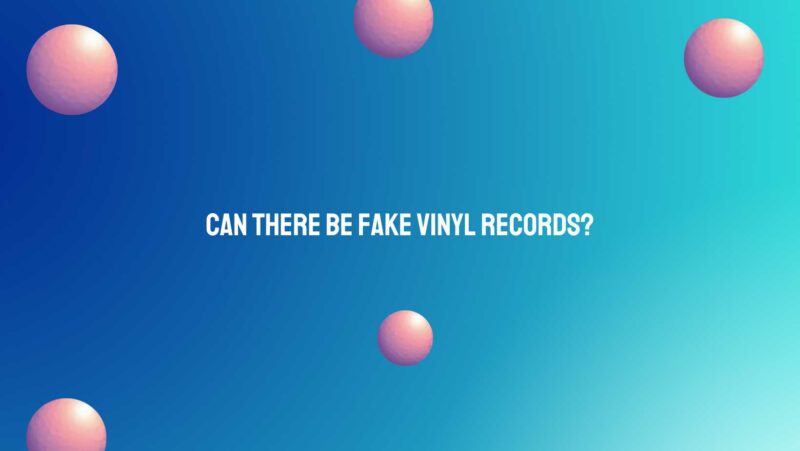Vinyl records have made an impressive comeback in recent years, captivating music enthusiasts and collectors with their analog charm and warm sound. This resurgence has led to a booming market for vinyl records, both new and vintage. However, with increased demand comes a growing concern: the emergence of counterfeit vinyl records. In this comprehensive article, we will explore the world of fake vinyl records, examining why they exist, how to spot them, and steps to protect yourself from falling victim to these phonies.
The Vinyl Resurgence
Before diving into the issue of fake vinyl records, it’s crucial to understand the context of the vinyl resurgence. Vinyl records, which were once thought to be obsolete with the advent of CDs and digital downloads, have made a remarkable comeback. Audiophiles and music enthusiasts have rekindled their love for the format, appreciating the tangible, nostalgic experience that vinyl offers. This renewed interest has led to a surge in vinyl sales, a revival of vinyl pressing plants, and a vibrant collector’s market.
The Rise of Fake Vinyl Records
With the resurgence of vinyl, there has also been an uptick in the production of fake vinyl records. Counterfeiters have recognized the profit potential in exploiting the market’s demand for vinyl, especially for rare and highly sought-after releases. There are several reasons why fake vinyl records have become a problem:
- Profit Motive: Counterfeiters are motivated by profit. They can produce fake records at a fraction of the cost of genuine ones and sell them for a substantial profit, often deceiving unsuspecting buyers.
- High Demand for Collectibles: Collectors are willing to pay top dollar for rare and limited-edition vinyl records. This demand for unique items creates an attractive target for counterfeiters.
- Lack of Regulation: Unlike some other industries, the vinyl record market lacks robust regulation and oversight, making it easier for counterfeiters to operate without fear of legal repercussions.
Spotting Fake Vinyl Records
Detecting counterfeit vinyl records can be challenging, but there are several telltale signs to watch out for:
- Poor Quality Packaging: Many counterfeit vinyl records come with packaging that lacks the quality and attention to detail found in legitimate releases. Look for issues like blurry artwork, misspelled words, or shoddy printing.
- Suspicious Pricing: If a vinyl record is priced significantly lower than the average market price, it may be a red flag. Be wary of deals that seem too good to be true.
- Label and Matrix Runout Numbers: Examine the labels and matrix runout numbers on the vinyl. Legitimate records typically have precise and consistent labeling, while counterfeit ones may have errors or discrepancies.
- Weight and Quality of Vinyl: Authentic vinyl records are typically heavier and made from high-quality materials. Counterfeit records may feel lighter or have a lower-grade vinyl composition, affecting sound quality.
- Research and Authentication: Consult online forums, collector communities, and discography databases to verify the authenticity of a vinyl record. Experienced collectors can provide valuable insights and help you confirm whether a record is genuine.
Protecting Yourself from Fake Vinyl Records
To safeguard your vinyl collection and ensure you’re purchasing authentic records, consider these precautionary measures:
- Buy from Reputable Sources: Purchase vinyl records from established and reputable record stores, both physical and online. Reputable dealers are more likely to sell genuine products.
- Verify Sellers: If buying from an individual or an online marketplace, check the seller’s reputation, reviews, and history of vinyl sales. Be cautious when dealing with unknown or unverified sellers.
- Seek Expert Opinions: Engage with vinyl collectors and experts who can help authenticate records, especially if you’re investing in rare or high-value releases.
- Inspect the Record: Always examine the vinyl record and packaging before making a purchase. Pay attention to details and trust your instincts if something feels off.
- Be Skeptical of “Limited Editions”: Counterfeiters often produce fake limited-edition releases. Verify the authenticity of such items before buying.
Conclusion
The resurgence of vinyl records has brought immense joy to music enthusiasts and collectors, but it has also given rise to counterfeit vinyl records. These fakes not only compromise the authenticity of a beloved format but also deceive consumers and hinder the growth of a thriving market. By staying informed, vigilant, and cautious when purchasing vinyl records, you can protect yourself from falling victim to counterfeit releases and continue to enjoy the unique experience that vinyl provides.


